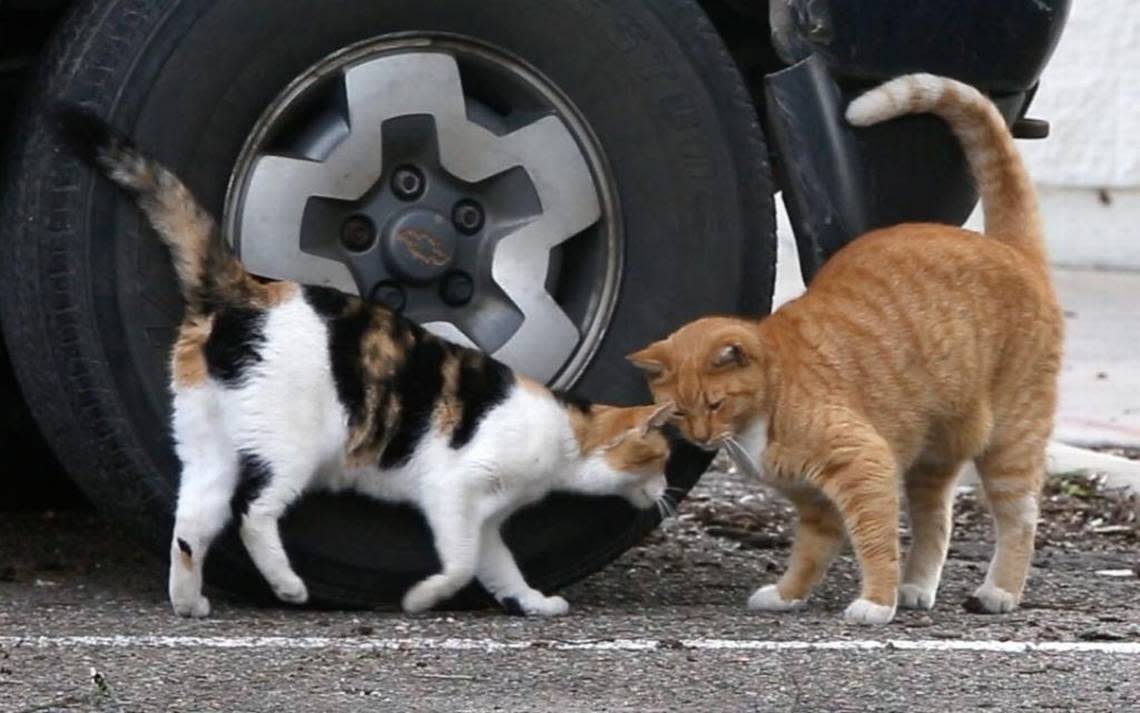In Durham, stray cats are no longer strays. They’re community cats.
Durham County will soon begin a program to spay, neuter and vaccinate its swelling population of stray cats, releasing the animals back into the community with clipped ears that mark them as “community cats.”
The Board of Commissioners unanimously voted Monday night to change the county’s animal control ordinance to pave the way for a trap-neuter-release program, though they’ve yet to decide who will actually run it.
Community cats will only be euthanized when deemed “medically necessary to prevent physical suffering.”
Shafonda Allen is the director of the Animal Protection Society of Durham, the nonprofit that runs the county’s only shelter. Last year, it took in 1,744 cats and killed 231 of them.
“When I left the shelter today,” Allen told the commissioners, “we were full, completely full. Not one single cage left for cats. We actually set carriers up on the floor in case cats came in overnight.”
County officials estimate Durham’s feral cat population has more than tripled in the past decade, now estimated to number over 60,000. The Humane Society says a female cat can produce more than 100 kittens over the course of its life.
Wendy Pinner, lieutenant for animal services at the Durham County Sheriff’s Office, said they’ve stopped responding to requests to trap and remove cats because of overcrowding at the shelter. They get more than 200 requests a year, with businesses and homeowners complaining about scratched cars, urine and feces, dug-up gardens and allergies.
“One of my concerns is if we do not give citizens a remedy to their problem, they will take matters into their own hands when it comes to these cats,” Pinner said.
The ordinance says a trapped cat would be released in the same location with the tip of an ear clipped off to mark its status as sterilized and vaccinated.

Do trap-neuter-release policies harm NC birds?
Cats hunt vast numbers of birds, with recent studies estimating North American cats kill between 10 and 30 billion wild birds and mammals each year.
“They’re astounding predators,” said Andrew Hutson, executive director of Audubon North Carolina, speaking out against the trap and release program. “We don’t want to replace one bad policy with another bad policy.”
“These programs should be called trap, neuter and re-abandon,” added Barbara Driscoll, president of the local Audubon chapter, New Hope Audubon Society.
A 2019 study found 75% of a colony must be sterilized to effectively reduce population size over time.
“We all want fewer cats,” said John Graves, a strategist at Best Friends Animal Society, an organization that advocates for no-kill policies. “Spayed and neutered cats migrate far less and cause fewer behavior issues.”
Danielle Bays, senior analyst for cat protection policy at the Humane Society of the United States, said trap-neuter-release programs are now standard practice nationwide. Wake and Orange counties both support programs.
“They’ve been shown as effective in those communities that have adopted them, and they’ve been shown as effective in peer-reviewed scientific journal articles,” Bays said.
The county still must decide who will actually run the program and how to pay for it.
“There’s still a lot of work to be done,” said Acting County Attorney Willie Darby.
The commissioners set a February deadline for staff to meet with relevant nonprofits and businesses to form a plan. Pinner said additional deputies, office staff and equipment would be needed if the Sheriff’s Office were to administer the program.
Interested in adopting a pet? Visit the Animal Protection Society of Durham at 2117 E. Club Blvd.
The Durham Report
Calling Bull City readers! We've launched The Durham Report, a free weekly digest of some of the top stories for and about Durham published in The News & Observer and The Herald-Sun. Get your newsletter delivered straight to your inbox every Thursday at 11 a.m. featuring links to stories by our local journalists. Sign up for our newsletter here. For even more Durham-focused news and conversation, join our Facebook group "The Story of my Street."
